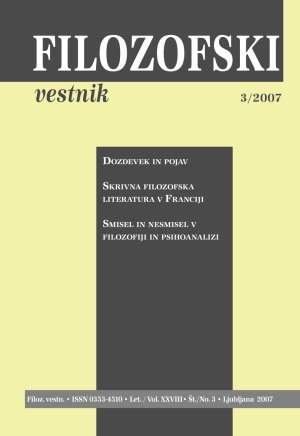Ob logiki smisla in nesmisla pri Deleuzu
Ključne besede:
smisel, dogodek, nesmisel, Deleuze, praznoPovzetek
Deleuze smisla ne pojmuje na običajni način, zanj je smisel ravno nekaj, kar se zoperstavlja zdravemu razumu, kar je v temelju zaznamovano s paradoksom in kar ni ne denotacija, ne manifestacija ne pomen, pač pa mu kot neki neobstoječi entiteti četrte osebe ednine, kot dogodku pritiče status dodatka k biti. Smisel je dogodek, ki kot identiteta forme in praznega napoteva na tisti paradoksni element, brez katerega ni mogoče misliti strukture. Natanko ta paradoksni element pa je za Deleuza nesmisel, ki pa ga je treba ločevati tako od absurda kot tudi od pod-smisla, Untersinn. »Igra smisla in nesmisla« pa ima po našem mnenju mejo v vitalističnem pojmovanju singularnosti, kot tistega pravega subjekta, ki skrit izza zastora vleče niti. Če je Deleuzova temeljna zastavitev, navkljub temu, da sam koncept smisla izgine, vendarle do konca, do dela Kaj je filozofija?, ostala skorajda nespremenjena, se postavlja vprašanje, komu ali čemu potem pripada strateška vloga, ki jo v Logiki smisla, odigra nesmisel?Prenosi
Podatki o prenosih še niso na voljo.
Prenosi
Objavljeno
2016-03-05
Kako citirati
Klepec, P. (2016). Ob logiki smisla in nesmisla pri Deleuzu. Filozofski Vestnik, 28(3). Pridobljeno od https://ojs.zrc-sazu.si/filozofski-vestnik/article/view/4403
Številka
Rubrike
Smisel in nesmisel v filozofiji in psihoanalizi
Licenca
Avtorji jamčijo, da je delo njihova avtorska stvaritev, da v njem niso kršene avtorske pravice tretjih oseb ali kake druge pravice. V primeru zahtevkov tretjih oseb se avtorji zavezujejo, da bodo varovali interese založnika ter da bodo povrnili morebitno škodo.
Podrobneje v rubriki: Prispevki





